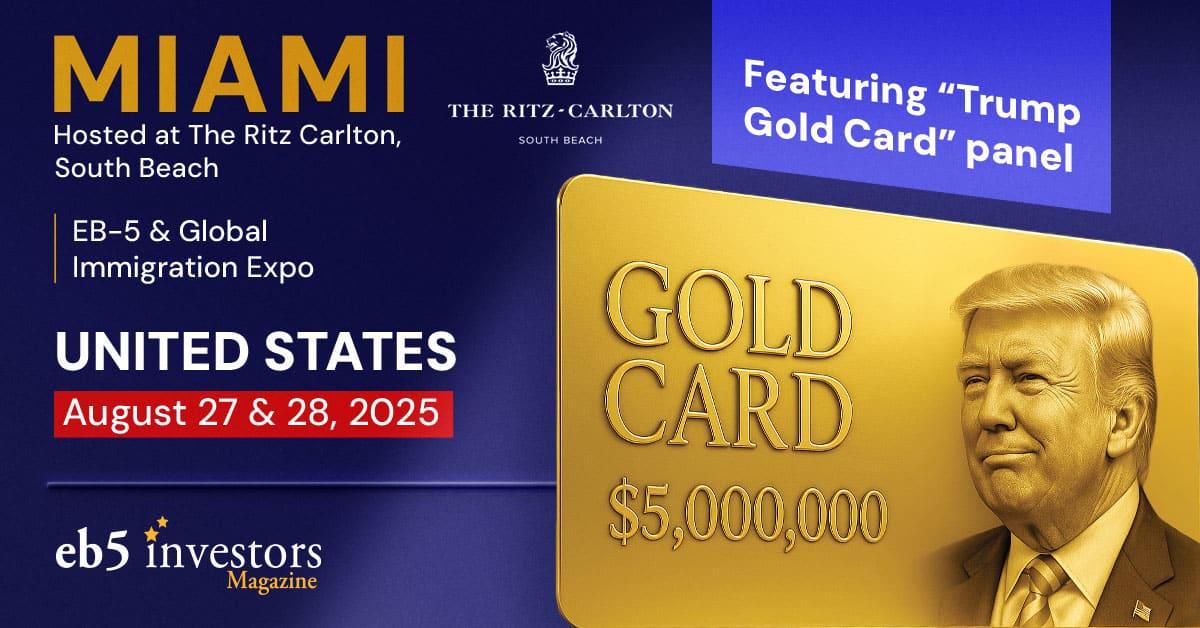
The EB-5 program is currently experiencing a significant backlog in visa applications, especially for investors from China and India. However, this situation does not equate to the 250,000 individuals “waiting in line” for this U.S. visa pathway that Commerce Secretary Howard Lutnick stated when announcing the potential reshaping of the EB-5 visa program and the creation of a U.S. Gold Card.
If more than 200,000 foreign investors waiting for an EB-5 visa paid the $5 million required for the recently announced U.S. Gold Card, they could potentially generate over $1 trillion to stimulate the U.S. economy and help reduce the national debt, according to Secretary Lutnick.
“The available data, anyway you slice it, does not show 200,000 people waiting for visas or long visa waits for new investors,” said EB-5 immigration attorney Daniel Lundy at Chiesa Shahinian & Giantomasi PC.
The EB-5 data on applications and approvals
According to business plan writer Suzanne Lazicki‘s calculations, about 60,000 qualified EB-5 visa applications are currently approved or pending processing by USCIS across various EB-5 visa categories based on Department of State (DOS) data. This count includes investors who filed before the Reform and Integrity Act (RIA) of 2022.
Of this total, 44,600 applicants fall into the Unreserved category, which includes EB-5 investors from China, India, and the rest of the world. Additionally, nearly 15,000 individuals are categorized under High Unemployment Areas (HUA) and Rural set-asides, though no data is available for the Infrastructure category.
Consequently, there are significantly more EB-5 applicants than the 11,470 available EB-5 visas for fiscal year 2025.
Secretary Lutnick said on Feb. 27 the selling of the gold card would begin in about two weeks. However, the Trump Administration has yet to clarify whether the new visa will replace the EB-5 program or exist alongside it.
“The President’s proposal would provide an alternative to competing for a green card on the basis of professional merit, employment, or investing in job creation, as in the current EB-1, EB-2, EB-3, EB-4, and EB-5 categories,” Lazicki said. “However, the President has not stated any plans to abolish existing employment-based categories. Commerce Secretary Lutnick, on the other hand, has expressed a negative view of EB-5, and speaks of the Gold Card proposal as an opportunity to change or replace the EB-5 program.”
How does the backlog impact EB-5 investors?
Meanwhile, the DOS has warned of a potential backlog of EB-5 visa applications that could arise in 2025 due to the high demand for regional center investments through the set-aside categories established by the RIA: Rural Areas, High-Unemployment Areas (HUA), and Infrastructure.
This high demand might surpass the available supply of visas, resulting in a backlog of applications awaiting processing by USCIS.
Lundy also highlighted the significant backlog for legacy Mainland Chinese investors, a situation arising from the success of the EB-5 program in attracting investors from 2012 until the program’s first expiration in 2021. Congress renewed the EB-5 program in March 2022 with the approval of the RIA.
However, he cautioned that predicting backlogs in the EB-5 program is challenging due to numerous variables and the lack of USCIS data.
DISCLAIMER: The views expressed in this article are solely the views of the author and do not necessarily represent the views of the publisher, its employees. or its affiliates. The information found on this website is intended to be general information; it is not legal or financial advice. Specific legal or financial advice can only be given by a licensed professional with full knowledge of all the facts and circumstances of your particular situation. You should seek consultation with legal, immigration, and financial experts prior to participating in the EB-5 program Posting a question on this website does not create an attorney-client relationship. All questions you post will be available to the public; do not include confidential information in your question.








